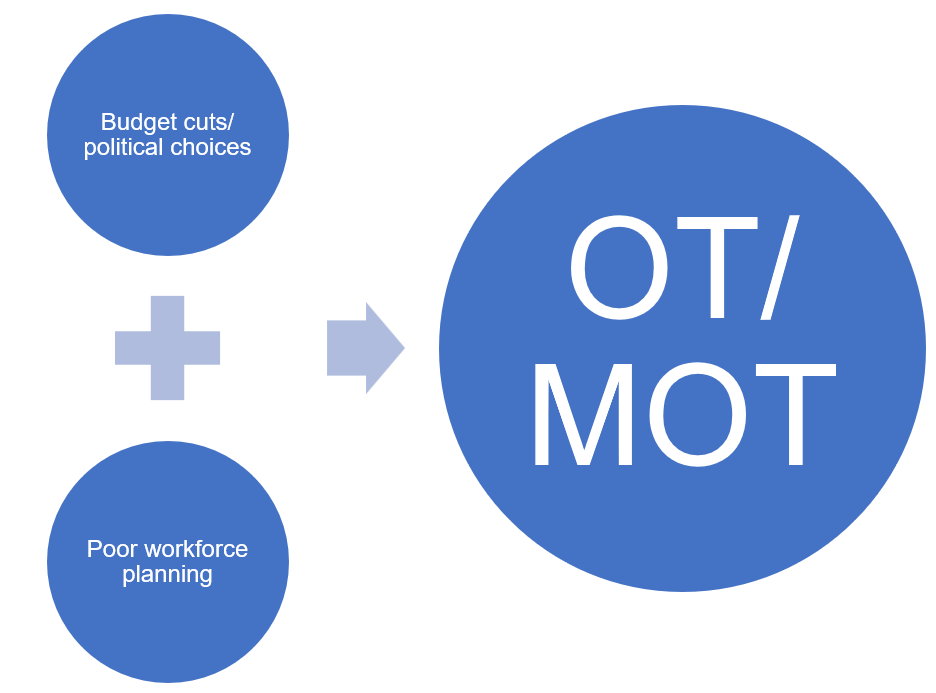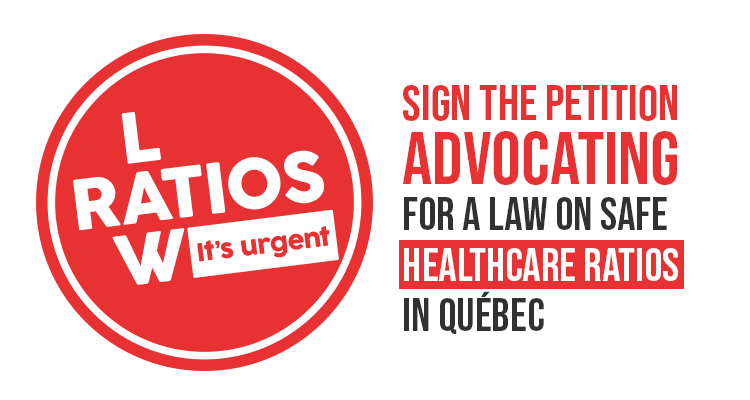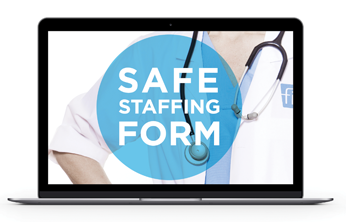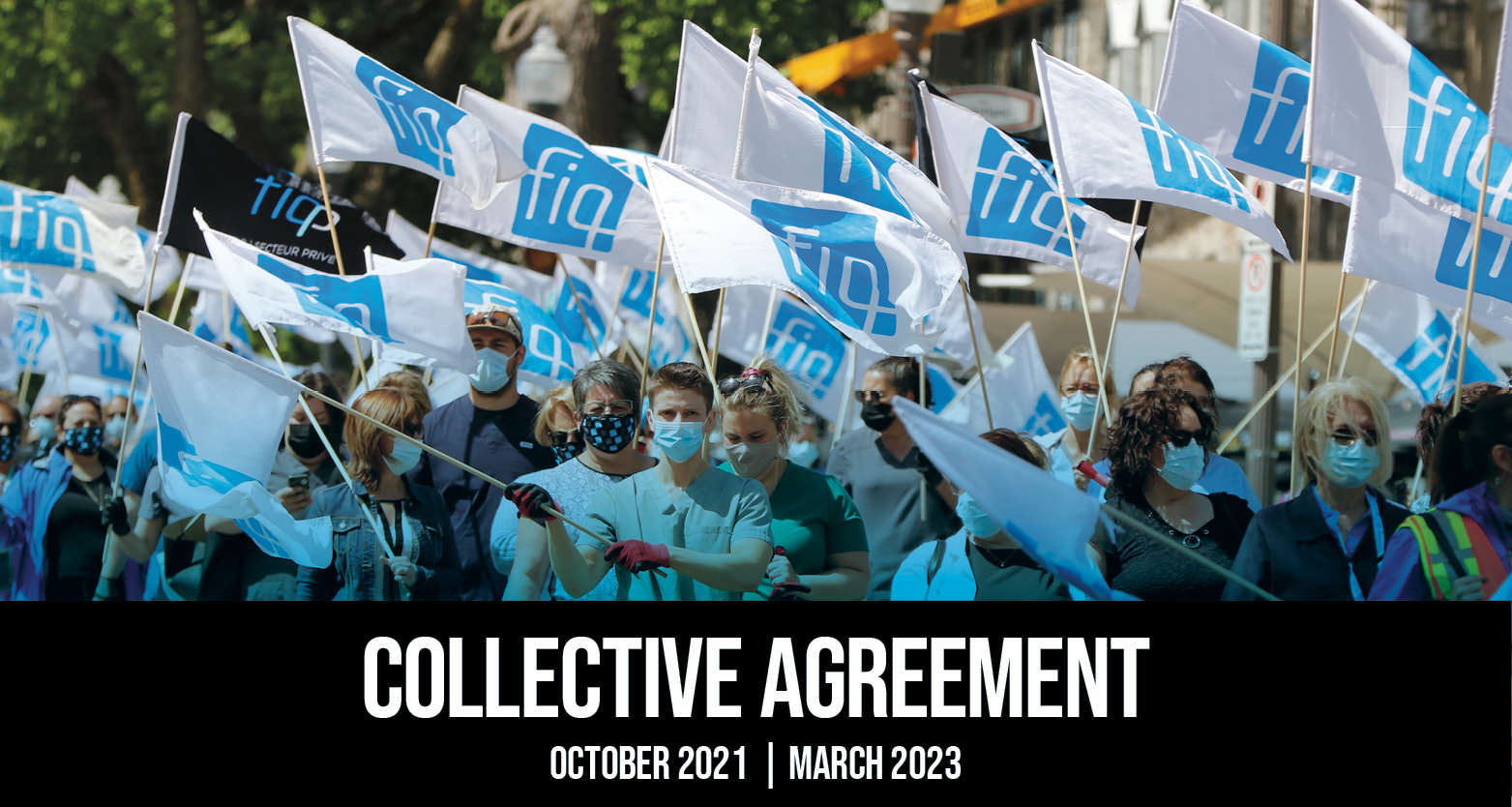MOT, let’s continue taking action together!
MOT Inquiry form for a collective grievance
In December 2022, the delegation, meeting at a Provincial Council, chose to put a new approach to contesting mandatory overtime (MOT) in place. This new procedure promotes filing collective grievances on the Employer’s practice or management method, while claiming damages for prejudices incurred by members.
The ultimate goal is to tackle this scourge more effectively and put an end to this management method in order to meet the current, planned and/or foreseeable needs for healthcare professionals.
If you have to work MOT, check with your local team if a collective grievance is in progress and covers your situation. This could be the case.
If yes, add your situation to this collective grievance by completing the MOT Inquiry form for a collective grievance.
How to do it
- Download the form (PDF) or get a copy from your local union team
- Complete it
- Send the duly completed form to your local team
Quick reminder on MOT
- The Employer may not use mandatory overtime at any time as a systemic practice to replace absences.
- It must be an urgent, exceptional and unforeseen situation to consider, as a last resort and after taking the means to avoid it, using mandatory overtime.
What you need to know about MOT
For several years, the FIQ and its members have denounced the use of overtime, whether it is mandatory (MOT) or voluntary (OT), by many employers in the health network as a management method to overcome various problems caused by poor resource planning and budget cuts.
However, these reasons are not enough to justify the dangers and resulting harmful consequences! We must continue taking action collectively and at the local level to stop this inadequate management method.

Rather than setting up stable and adequate teams, the health institutions can use an almost unlimited overtime budget. Every year, it costs the government hundreds of thousands of dollars.
Using overtime should only happen in unforeseen circumstances (work overload, unforeseen staff absences, emergency). The provincial days without MOT, held on April 8 and November 15, 2019, showed that with better planning, stable teams, a political will and efforts by the network managers, it’s possible to significantly reduce the use of MOT. Moreover, the Administrative Labour Tribunal rendered a positive decision for the FIQ recognizing that overtime must be used in urgent and exceptional situations.
A proven solution: safe ratios
Safe healthcare professional-to-patient ratios are the solution to the ills that currently plague the network. With safe ratios, there are always adequate teams for a given number of patients, based on the type of care they need. Care teams are stabilized and there is better planning of resources, leading to less use of OT and MOT.
Moreover, implementing safe ratios:
- Attracts healthcare professionals to the network and keeps those already working in it healthy;
- Improves the quality and safety of patient care;
- Ensures a more efficient health network.
Codes of ethics and patient advocacy
The codes of ethics subject the healthcare professionals to certain obligations including those of ensuring the continuity of care by waiting for competent relief and providing quality care by avoiding practising in a condition likely to compromise that care.
If you find yourself in a situation where you are forced to work overtime, you need to consider what protects the public. The patient’s condition, the type of centre of activities and the availability of qualified staff must be assessed. But more than that, individual professional responsibility also means speaking out about the quality of care you can provide because of the management practices you are subject to.
When exhausted due to overtime or other unacceptable practice conditions prevent you from providing care according to practice standards, it is important to report the situation to your managers. It is also important, when faced with their inaction, to denounce and add your voice to that of your work colleagues and your union teams to fight for your patients right to receive safe care, and thereby protecting and promoting your professional integrity and clinical judgment.
That is what we call patient advocacy. These actions are essential in defending the patients’ rights and interests.
Safe Staffing Form
The FIQ has a Safe Staffing Form for its members. This form, that you can complete online in only a few minutes, enables you to report unsafe situations for you or your patients directly to your union. Working overtime is a good example of a situation that may be covered by using this form.
Although this form does not replace a grievance, a statement of a dangerous situation or an incident-accident report, it is a tool that supports the demands or for implementing solutions to counter overtime or poor management on your unit. Your union team receives this form, and they can implement actions to eliminate the situation.
Collective agreement
Article 19 of the collective agreement which deals with overtime does not provide for a situation where there is a lack of volunteers to work overtime. Some arbitrators feel that, when the collective agreement is silent on the obligation to work overtime, it is a management right. On the other hand, the employer may require an employee to work overtime when this is the only possible measure to ensure the services generally provided.
However, the FIQ is of the opinion that an employer may not force an employee to work more than the regular workday or regular workweek, especially when overtime has become systematic. To force an employee to work overtime, the employer must:
- Exhaust all other means set out in the collective agreement (replacement team, availability list, etc.) and prove that using overtime is the only possible measure for providing the services generally provided;
- Distribute it equitably;
- Give a clear and specific order;
- Ensure that the number of overtime shifts required is not exaggerated;
- Take into account the legislation which limits their right to force overtime work;
- Take into account the reasons for refusing.
If the employer decided to impose a disciplinary measure on an employee who refused to work overtime, an arbitrator may analyze, based on the above-mentioned criteria, if the employer exercised their management right abusively, unreasonably or in a discriminatory manner.
Act respecting labour standards
The Act respecting labour standards applies to both unionized employees and to those not subject to a collective agreement. It sets a general limit on working hours and section 59.0.1 clearly stipulates a right to refuse to work beyond the number of regular work hours. This provision also stipulates the right to an advance notice.
Hence, an employee can exercise her right to refuse to work:
- Daily, after:
- More than 2 hours after her regular hours or more than 14 hours per 24-hour period, whichever period is the shortest;
- Weekly, after:
- More than 50 hours,
- or more than 60 hours for an employee who works in a remote area or who works in the James Bay territory;
- When she is not informed 5 days in advance that she must work. However, this right to refuse may not be exercised in the following situations:
- the nature of her duties requires her to remain available,
- when the work required is within the limits of work that can be done daily (see the 1st possibility).
Two situations limit these possibilities of refusing to work:
- If there is a danger o the life, health or safety of employees or the population;
- If the refusal is inconsistent with the employee’s professional code of ethics.
According to the FIQ, the healthcare professionals have this right to refuse. However, because they are governed by a code of ethics, they cannot outright refuse to work and must evaluate the context.
Section 122 (6) forbids an employer from dismissing, suspending or reassigning an employee, practising discrimination or taking reprisals against her, or imposing any other sanction upon her when she exercises her right to refuse in the above-mentioned circumstances. This is a provision that encourages work-family balance. Taking into consideration her ethical obligations, an employee asked at the last minute to work overtime can demonstrate that she is unable to organize for it.
Act respecting occupational health and safety
This law enables an employee to refuse to work when performing her work due to its excessive duration, exposing her to a danger to her health, safety or physical well-being or exposing another person to a similar danger. In this context, the employee may also ask for the intervention of a CNESST inspector. This same law allows the CNESST to determine a maximum duration for performing some jobs, per day or per week.






